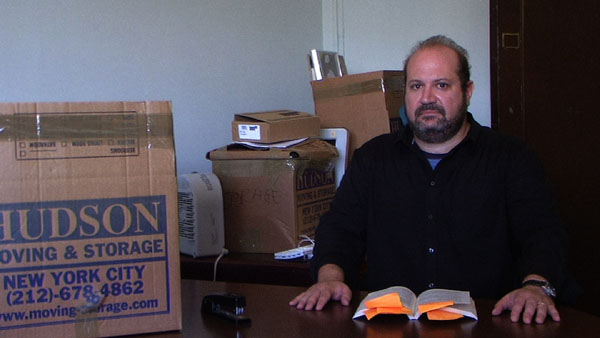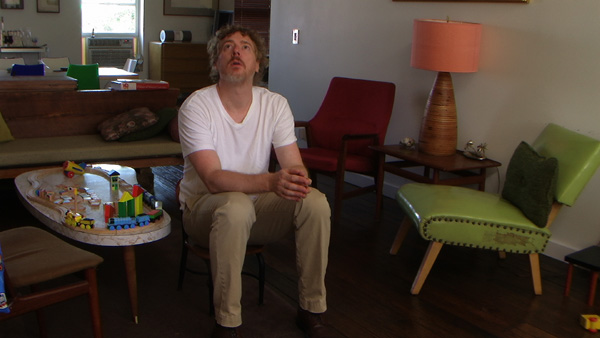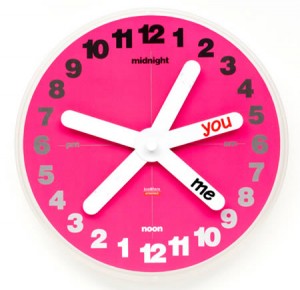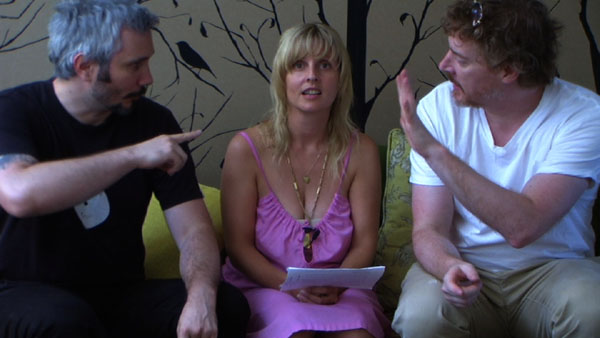Michael Kimball Guest Lecture #3: The Rough Parts

Here’s a quote from Rachel Carson: “The discipline of the writer is to learn to be still and listen to what his subject has to tell him.” I always read “still” as “sit still,” which makes me think of this quote from Harry Crews (via Opium): “Sometimes you need to affix your ass to the chair.” That is, sometimes, sitting down and doing the work can be the most difficult part of being a writer. Sometimes, it’s the other parts of life that get in the way. Other times, it is the fiction itself, how we think about the fiction at different points in the process.
So how does the writer get through the rough parts, the blank parts, the parts that we know suck? Virginia Woolf says it is determination: “It is worth mentioning, for future reference, that the creative power which bubbles so pleasantly in beginning a new book quiets down after a time, and one goes on more steadily. Doubts creep in. Then one becomes resigned. Determination not to give in, and the sense of an impending shape keep one at it more than anything.”
Michael Kimball Guest Lecture #2: Keeping Going
So let’s say we have a great opening and maybe even a good idea or an interesting voice to go with it. Now what? How does the writer keep going? One of the things that has helped me keep going while I’m working on a novel is not thinking about it. That is, I try to not think about what I’m writing when I’m getting it down (the thinking, so to speak, comes later). For me, it’s just a voice speaking, a way of talking, and I’m trying to be receptive to it, open. I’m just trying to get from one sentence to the next sentence. Often, I do this by looking at the previous sentence—its syntax, the words in play, the acoustics of it—I’m thinking in these small ways, but not so much in bigger ways (say, story or plot or idea). I’m just trying to get material down, which is the hardest part for me. After that, after I have something to work with, then I feel like I can do something with whatever I have on the page. It’s the blankness that is difficult for me, filling in the blankness.
Here are some quotes from Sam Lipsyte, Gary Lutz, Joseph Young, and Blake Butler that discuss a similar process in somewhat different ways.
Michael Kimball Guest Lecture Series (1): Openings

[We’re very excited to have today and in coming weeks a series of guest posts from the one and only Michael Kimball, author of three novels included the much lauded Dear Everybody. Enjoy! — BB.]
I’m doing a talk-thing at a free writing conference and the talk is going to be called something like “The One-Hour Crash Course in Fiction Writing.” I’m going to try to cover ways to think about beginnings, language, syntax, details, voice, character, plot, story, revising, endings, etc. I had the idea because it has always been little bits of advice, something that I could hold in my head — whether from a teacher, from something I read, or from another writer — that were the most useful thing to me as I tried to figure out what I wanted to do as a writer. So this will be the first in a series of guest posts about some of the elements of fiction. The posts will include the ways that I think about different elements of fiction, the ways other writers and teachers do, and, hopefully, it will lead to a larger discussion – how you think about it, other ideas from other writers and teachers, etc. OK, here we go:
Openings, there are lots of ways to think about them. Chris Offut said, “The secret is to start a story near the ending.” Elmore Leonard said, “Never open a book with weather.” One of my old teachers used to talk about the importance of the first sentence, the need to overcome of the inertia of nothingness, to immediately capture the reader’s attention. She amended that to say that the first sentence needed to be declarative in some sense, to have a particular syntax and diction, to have resonant acoustical properties. Those first sentences that immediately come to mind, many of those are first sentences that do that. And there are lots of examples, below, from people who are thinking about first sentences.
Another killer interview from Michael Kimball, this time with Brian Evenson, at the Faster Times.
Michael Kimball Interviewed on NPR

Unless you’re weird, you probably already listened to Giant amigo Michael Kimball’s interview on NPR. It’s about his project, Michael Kimball Writes Your Life Story (On a Postcard), which, unless you’re weird, you’re probably already hip to, too.
I thought the interview was great, that what he said was about more than his project, and more than a criticism of Facebook culture — that we’re all promoting ourselves but no one cares — but it was about a profound sort of other-centeredness, about Story and the importance of getting to know the story of other people’s lives.
I’d say more but I gotta go read some Levinas. What did you think of the interview?
Oh, and check out this video of Blaster Al Ackerman reading for the 60 Writers movie Michael’s making with Luca Dipierro (I know, Sam linked to one yesterday but what the heck, my man was just interviewed on NPR).
June issue of Elimae is now live with many wonderful words, as well as a particularly interesting interview of Unsaid’s David McLendon by Michael Kimball.
NEW LAM-COL DEPLETES HEMORRHOIDS WITH A WARM PIN
 there is a new lamination colony. lamination colony is by far my favorite online journal. the new lam-col was edited by michael kimball, who i’m assuming is the brother of detective john kimball from kindergarten cop. so far i liked the work by michael bible, adam robinson and gena “thug life” mohwish.
there is a new lamination colony. lamination colony is by far my favorite online journal. the new lam-col was edited by michael kimball, who i’m assuming is the brother of detective john kimball from kindergarten cop. so far i liked the work by michael bible, adam robinson and gena “thug life” mohwish.
March 31st, 2009 / 11:18 pm
‘I Will Smash You’
Michael Kimball and Luca Dipierro have been working for a while now on a video project, ‘I Will Smash You,’ which entails, essentially, videos of people smashing stuff, most often items germane in some way to their life.
A new trailer for the film features Michael Kimball going to town on a desk, which is a dark fantasy I live through almost every day. It is nice to see the release contained:
Crystal Gavel, New Lights Press, Michael Kimball don’t ever change (your jacket)
 Sean Lovelace turned me on to his new Ander Monson-inspired journal, The Crystal Gavel (v1). This first issue features new work from Ander Monson, Darby Larson, Daniel Bailey, yours truly and more. Not just anyone can get published there, though: Amazon is handling the rejections.
Sean Lovelace turned me on to his new Ander Monson-inspired journal, The Crystal Gavel (v1). This first issue features new work from Ander Monson, Darby Larson, Daniel Bailey, yours truly and more. Not just anyone can get published there, though: Amazon is handling the rejections.
This is an important idea, really. Fight absurdity because it is yours to defeat. I am excited to see what’ll happen in issue 2.
So what else is new?
Aaron Cohick of New Lights Press, the wizard that brought us the $400 Brian Evenson book (no shit, $400 — I offered Cohick $200 cash on the spot for a copy and he declined — what an ethos! Eat it, JA Tyler and your $2 Evensons [do we need a link?]!) is looking for writers who want to work with him on an artist book version of their work. Check out the press, consider it carefully, see what happens.
Also, I really, really like this video about Michael Kimball and his book Dear Everybody (which, though it’s a pretty high-ranking book, has only half the reviews that the crystal gavel has) (eat it, Michael Kimball). Michael Kimball once published a poem in The Quarterly that went like this: Now Do You Remember?
This concludes my first ever HTML Giant mamma-jamma (sp?).

